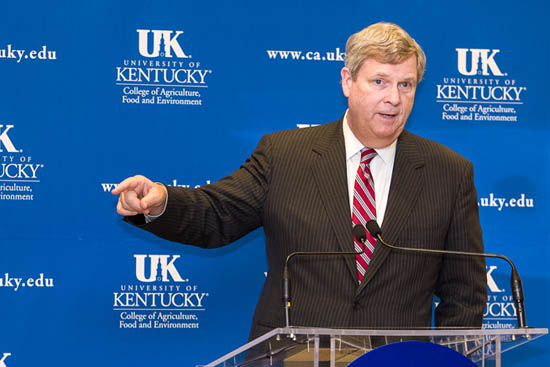Secretary of Agriculture encourages UKAg students to be part of rural economy
Secretary of Agriculture encourages UKAg students to be part of rural economy

The economic health of the country’s rural communities affects us all, Secretary of Agriculture Tom Vilsack stressed as he spoke recently to students and faculty of the University of Kentucky College of Agriculture, Food and Environment.
“There is amazing opportunity if you want to be part of a new rural economy,” Vilsack said. “That is the single message I want to leave with the young people here today.”
UK was Vilsack’s first stop on a two-day swing through Kentucky.
“Secretary Vilsack’s visit gives us a chance to thank him for the U.S. Department of Agriculture’s and the National Institute for Food and Agriculture’s support of the college, which is significant,” said Jimmy Henning, UK associate dean for extension and director of the Kentucky Cooperative Extension Service. “I think it’s important for him to see how this actually plays out on the ground.”
Dean Nancy Cox introduced Vilsack, saying, “We really believe that together with the USDA, we make a difference in Kentucky every day, and we’re very proud to welcome you.”
Vilsack focused on the problem of poverty in rural America as he spoke to a full house in the Cameron Williams Auditorium in the Plant Science Building on campus.
“These have probably been the five best years overall in agriculture we’ve seen in quite some time—record farm income and the best exports we have ever seen in the history of the country’s agricultural exports,” he said. “I fully expected traditional wisdom to play out, which is when farmers do well, the rural community does well.”
However, a study completed by the USDA’s Economic Research Service found that poverty in rural America is at its highest level in 25 years.
“How could it be that we have extraordinary opportunity in our farms and the rural communities that are located around the farms are not doing as well?” Vilsack said. “I think it’s because we have so few farmers.”
He pointed out that because productivity has increased greatly, it takes fewer farmers to produce food for not only the U.S. population, but also other populations around the world.
He outlined the four cornerstones of the USDA’s tactics to combat the problem.
“It starts with production agriculture, as it must,” he said. “We have to continue to invest in research to expand production, because as a world we’re faced with the challenge of producing 70 percent more food in the next 40 years.”
He acknowledged to the students that it is presently difficult for young people to establish themselves in farming. The entry way, as he sees is, is through a local and regional food system, not necessarily production farming.
“So, production agriculture and exports, local and regional food systems and the jobs and the stable incomes they can create,” he said, ticking off the plan. “But it requires more. It requires us to think differently about conservation…. We have to link those conservation opportunities to new economic opportunities.
“And the last cornerstone of this new revived rural economy is what I refer to as a bio-based economy: the ability to take everything we grow and everything we raise and create new ways to use them. Particularly the waste products from agricultural production.”
Vilsack traveled to Eastern Kentucky on Jan. 17, where he and Gov. Steve Beshear announced the designation of Kentucky as a StrikeForce state. StrikeForce currently exists in 16 states and provides greater access to the USDA’s poverty-fighting programs. This announcement comes on the heels of the Obama administration’s naming of eight southeastern counties as a Promise Zone. That specification, Vilsack said, was a commitment that federal departments will work collaboratively with local groups to bring more opportunities to the region.
“It’s an unlimited future, but we have to talk differently, and we have to educate our friends in cities and suburbs about precisely what rural America does for them and what farmers do for all of us,” he said. “We should be appreciative and thankful for every single person who has assumed that responsibility of feeding our families.”
Community Development Events


